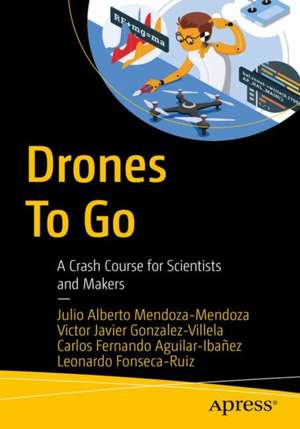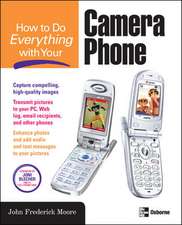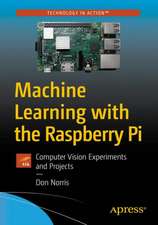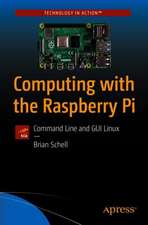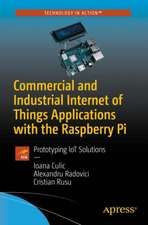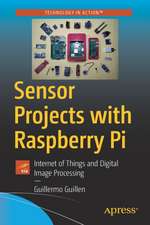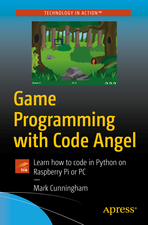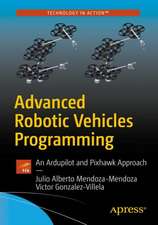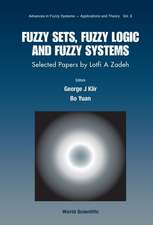Drones to Go: A Crash Course for Scientists and Makers
Autor Julio Alberto Mendoza-Mendoza, Victor Javier Gonzalez-Villela, Carlos Fernando Aguilar-Ibañez, Leonardo Fonseca-Ruizen Limba Engleză Paperback – 11 feb 2021
You'll review key features often missed in other books: a deeper review of controls, step by step modeling, and methods for simulating and designing drones. Although the quadcopter is used as the main example throughout the book, you'll also see how to apply the development knowledge to other aircrafts or aerial systems.
Highly visual and easy to understand, this book features Simulink and Matlab tools, but the skills covered can be used in other environments such as Scilab or other programming languages. Drones To Go merges maker knowledge and technical information with scientific knowledge and design essentials.
What You’ll Learn
- Review the main families of control: geometric, linear, and common dynamic feedback control
- Understand the mathematics of a quadcopter
- Follow step-by-step instructions on modeling and control equations
- Focus on pedagogical development to answer any doubts in the design process
Who This Book Is For
Makers to scientists
Preț: 305.01 lei
Preț vechi: 381.27 lei
-20% Nou
Puncte Express: 458
Preț estimativ în valută:
58.37€ • 63.38$ • 49.03£
58.37€ • 63.38$ • 49.03£
Carte disponibilă
Livrare economică 01-15 aprilie
Preluare comenzi: 021 569.72.76
Specificații
ISBN-13: 9781484267875
ISBN-10: 1484267877
Pagini: 348
Ilustrații: XIX, 348 p. 502 illus., 130 illus. in color.
Dimensiuni: 155 x 235 mm
Greutate: 0.52 kg
Ediția:1st ed.
Editura: Apress
Colecția Apress
Locul publicării:Berkeley, CA, United States
ISBN-10: 1484267877
Pagini: 348
Ilustrații: XIX, 348 p. 502 illus., 130 illus. in color.
Dimensiuni: 155 x 235 mm
Greutate: 0.52 kg
Ediția:1st ed.
Editura: Apress
Colecția Apress
Locul publicării:Berkeley, CA, United States
Cuprins
Chapter 1: Drone Design Concepts.- Chapter 2: Modeling.- Chapter 3: Control of Drones.- Chapter 4: Simulation.- Chapter 5: Implementation.- Appendix: Additional Resources.
Notă biografică
Julio Alberto Mendoza-Mendoza is a Mechatronic Engineer with a Master in Advanced Technology from UPIITA IPN and PhD in Computer Sciences from CIC IPN, he is currently a visiting researcher at UNAM, his areas of interest and research are robotics in general (manipulators, aerial and terrestrial vehicles, humanoids, haptics, exoskeletons and teleoperation), programming, analytical and intelligent control, electronics and mechanical design. His most recent line of development is aerial robotic manipulators, he holds 5 patents and a books on Apress.
Victor Javier Gonzalez-Villela received the B.Eng. degree in Mechanical and Electrical Engineering and the M.Eng. degree in Electrical Engineering in 1987 and 1993, respectively, from the National Autonomous University of Mexico (UNAM), Mexico City, Mexico, and the Ph.D. degree in Kinematics, Dynamics, and Nonlinear Systems applied to Mobile Robot Modelling and Control from Loughborough University, Loughborough, UK, in 2006. He is currently a Titular Professor in the Department of Mechatronics Engineering, UNAM. Since 2013 he belongs to the National System of Researchers (SNI) of Mexico. His research focuses on Mobile, Hybrid and Adaptive Robots, and Artificial Intuition.
Carlos Aguilar-Ibañez graduated in Physics at the Higher School of Physics and Mathematics of the National Polytechnic Institute (IPN), Mexico City 1990. From the Research Center and Advanced Studies of the IPN (Cinvestav IPN) he received the M.S. degree in Electrical Engineering in 1994, and a Ph.D. in Automatic Control in 1999. Ever since he has been a researcher at the Center of Computing Research of the IPN (CIC IPN). As of 2000 he belongs to the National System of Researchers (SNI) of Mexico. His research focuses in nonlinear systems, system identification, observers, automatic control, and chaos theory.
Leonardo Fonseca-Ruiz holds a bachelor’s degree in Mechanical and Electrical Engineering from the National Autonomous University of Mexico (U.N.A.M.) in 2002, and M.S. degree from the Department of Electrical Engineering with the Specialty of Bio-Electronics by the Center for Research and Advanced Studies of the National Polytechnic Institute (CINVESTAV-IPN) in 2006. Currently He works as a full-time ResearchProfessor at UPIITA-IPN. Is author and co-author of 16 works published in magazines and congresses. His areas of interest are PLC, DSP, Microcontrollers, Automation, design and development of PCBs, and CNC systems.
Textul de pe ultima copertă
Learn the five key skills needed to become a quadcopter developer: design, modeling, control, simulation, and implementation. This book provides a crash course on drone development for beginners and can also serve as a comprehensive reference for those who want a detailed guide for future projects.
You'll review key features often missed in other books: a deeper review of controls, step by step modeling, and methods for simulating and designing drones. Although the quadcopter is used as the main example throughout the book, you'll also see how to apply the development knowledge to other aircrafts or aerial systems.
Highly visual and easy to understand, this book features Simulink and Matlab tools, but the skills covered can be used in other environments such as Scilab or other programming languages. Drones To Go merges maker knowledge and technical information with scientific knowledge and design essentials.
You will:
- Review the main families of control: geometric, linear, and common dynamic feedback control
- Understand the mathematics of a quadcopter
- Follow step-by-step instructions on modeling and control equations
- Focus on pedagogical development to answer any doubts in the design process
Caracteristici
Learn the nuts with this complete course on drones, multicopters, and quadcopters Work through step-by-step instructions to learn the five key skills needed to develop quadcopters Use this book as a crash course for drones, or as a reference guide for project
